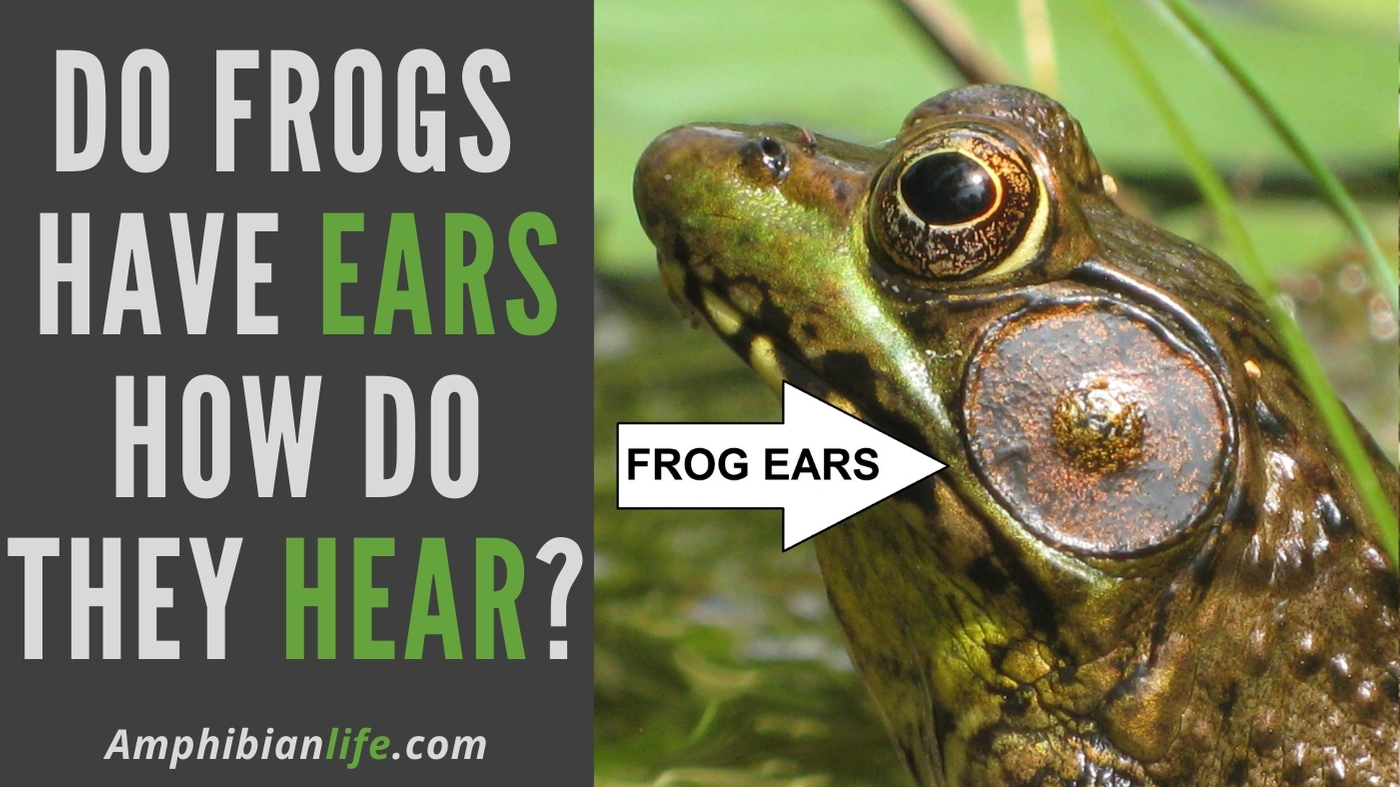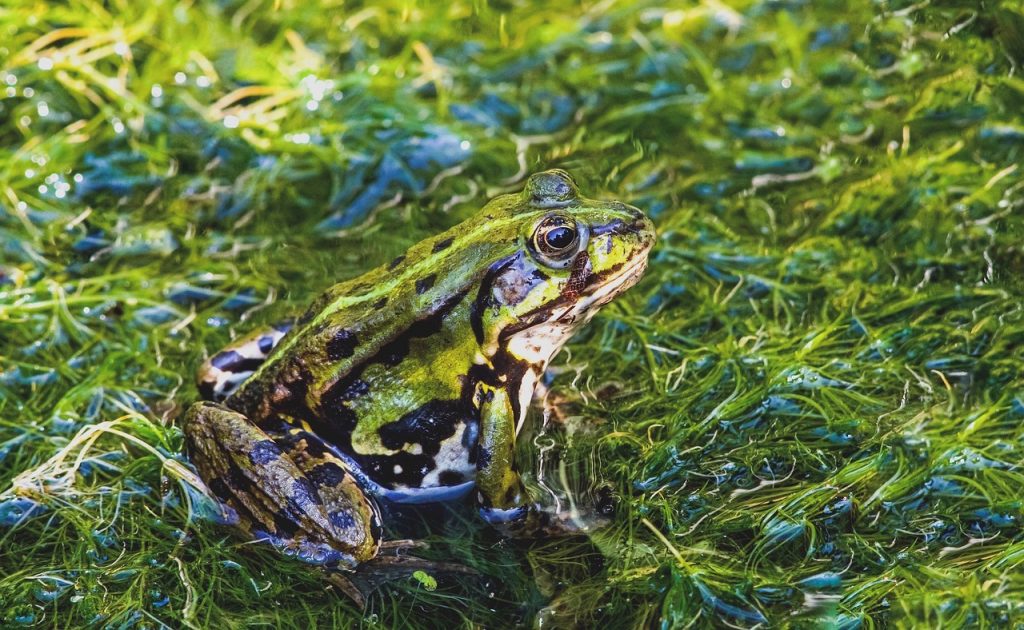
Have you ever seen a frog with human ears? I haven’t and think it would look quite weird. But this does not mean that frogs don’t hear anything around them.
Frogs do hear but their ears are sort of “hidden” so you can’t see them. Want to know exactly how frogs hear and where the ears are located? Keep reading this article!
So, do frogs have ears? Frogs do have ears, although they are not located externally. Frog ears are located internally and can be seen as a hole on each side of its head. You find the ears just behind the eyes. The ears are protected by tympanic membranes (also called eardrums). to protect the inner ear cavity and help transmit the sound vibrations.
How Do Frogs Hear
Now that you know that frogs have ears, I want to explain a little bit about how frogs hear. The hearing of a frog is very similar to that of a human. Just like you and me, a frog has an eardrum and inner ear.
But, as I said earlier, he doesn’t have earlobes or actual ears hanging on the side of their head just like us. This is because it would not be helpful to them (Think about hydrodynamics when swimming).
Instead of having the eardrum in the ear, as we do, frogs have the eardrum directly on the side of the frog’s head. This way the eardrum works like a shield for the inner ear.
This is called the tympanic membrane (also called tympanum) more on that later in this article (scroll down if you want to know more about it now)

Can Frogs Hear With Their Lungs?
Not exactly. But the truth is that the tympanum of frogs is actually connected to their lungs. Now I know this sounds crazy for now, but I hope it makes sense after this paragraph.
Ever wondered how frogs can make such loud noises without hurting their own eardrum? That is where the connection comes in.
The lungs vibrate and are almost as sensitive to hearing as their eardrums. This means that this allows the frog to make really loud noises without hurting their own ears!
How does this work you ask? The lungs have the special capability to equalize pressure differences between the outer surface of the eardrum and the inner surface of the eardrum. In this way, they can make really loud noises without hurting themselves.
Fun fact: This ability is also important in the ability to locate where other sounds are coming from.
Do Frogs Actually Have Good Hearing?
Frogs do hear what they need to hear. What I mean by that is the fact that some things they don’t hear well, and other things they hear fantastic. Let me explain a little further.
Frogs have a very short distance between their tympanic membrane and that is why frogs don’t hear high frequencies that well.
This has to do with the fact that there is more distance needed between the eardrum and inner ear to hear the high frequencies. Frogs hear lower frequencies much better.
A nice thing to know is that sounds travel from the outer ear, into the inner ear, across the roof of the mouth, and then into the inner part of the other ear.
This means that they hear a sound twice! Isn’t that something special? But wait, it gets better.
Do you remember that I talked earlier about the lungs being a part of the hearing mechanism?
A part of the body wall near the lungs vibrates in some species of frogs in response to high-frequency sounds. They think that this acts as another form of sound input so that they hear a little bit better.
Do you find this article interesting, but want to know more about how a frog makes the sound he makes, click here to read the article about how frogs croak and why.
How Does The Tympanic Membrane Work In A Frog?
As you now know the tympanic membrane is located right behind the eye of the frog. Good to know is that it is covered in skin that does not have any glands.
This means no sweat can come into the ear cavity. The tympanum (or tympanic membrane) works just like our own eardrum does.
In the ear, there is a bone attached to the tympanic membrane and when sound hits the membrane, the vibrations travel through the bone to the inner ear. This is also where the cochlea, papilla, and semicircular canals are.
Fun fact: The tympanic membrane works both below and above water to catch the sound.
Fun thing for teachers to experiment with
If you want to do something fun and show your students how sound travels through bones, you can de the following: Let a student plug their left ear with his or her left index finger.
Next, you put a struck tuning fork on their elbow and the sound will travel from the arm, through the finger bones into the ear. This is a cool way to show your students how sounds travel.
What Can Frogs Hear In The Water?
The nice thing about the ears of frogs is the fact that they work both in the water as on land. But does it make any difference for them in what they hear?
Not all frogs are capable of hearing well underwater, but some species have evolved to do this. They are able to hear and create calls underwaters.
Frogs that can do this are more often than not found in places where there is a huge frogs population and everyone is fighting for some “air time”.
What I mean by that, is that so many frogs and other animals make noise, that it is hard to be heard.
Some frogs start the make calls underwater to find mates more efficiently. While they communicate underwater, they avoid the noise created by all the noise around them from other frogs.
Related Questions
Does it cost a lot of energy to produce sound? Small frogs need a lot of energy to produce Calls. Good to know is that the vocalizing muscles can make up 15% of a male’s body mass! In females, this is not that high and is around 3%.
How do frogs localize sounds? Some biologists do believe that frog ears are placed too close together for them to localize the sounds others make effectively. The sound is localized by the time difference when the sound reaches each ear.
What is called a “vibration spot” close to the lungs vibrates in reply to the noise and this may be used to help localize the sound.
Why do frogs call after it rains? Male frogs croak because they try to attract a mate. But why after it rains? Rain creates optimal conditions for a female to lay her eggs… So males know that it is the best time to start finding a mate!
